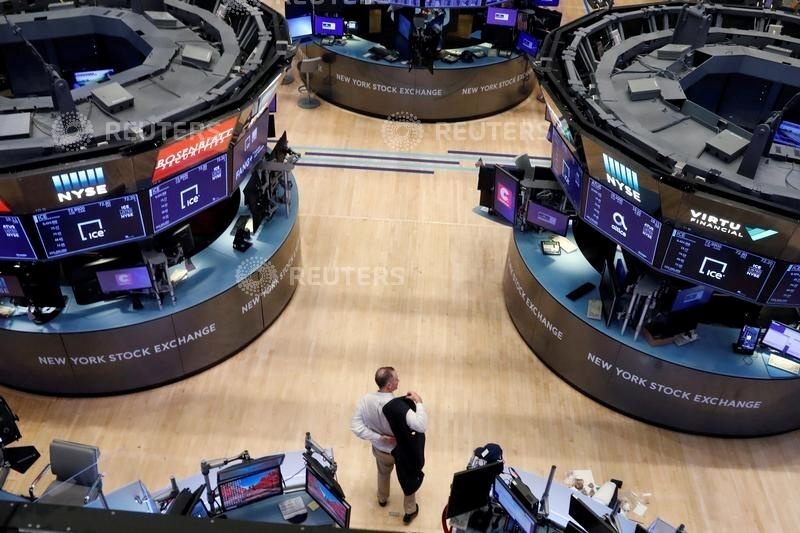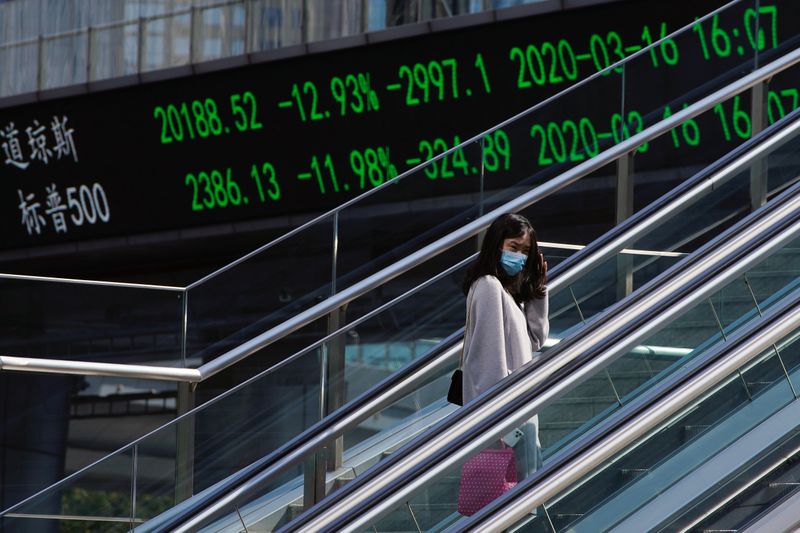By David Randall
NEW YORK (Reuters) - A historic plunge in U.S. crude oil prices pulled global equity markets lower on Monday and helped drive bond prices higher as investors sought out safe havens amid the economic carnage of the coronavirus pandemic.
With some global crude storage facilities nearly at capacity, the front-month May benchmark U.S. crude contract (CLc1) fell 307.44%, to -$37.90 per barrel, the first time in history that oil futures traded in negative territory. Brent (LCOc1) was at $26.05, down 7.23%.
"For oil there is a bit of a technical story (with storage), but still, if energy consumption is down 30% and OPEC reduces supply by 10%, there is still a large gap," said Elwin de Groot, Rabobank's head of macro strategy.
MSCI's gauge of stocks across the globe shed 1.15%, following broad declines in Asia and slight gains in Europe driven by the healthcare sector.
On Wall Street, the Dow Jones Industrial Average (DJI) fell 592.05 points, or 2.44%, to 23,650.44, the S&P 500 (SPX) lost 51.4 points, or 1.79%, to 2,823.16, and the Nasdaq Composite (IXIC) dropped 89.41 points, or 1.03%, to 8,560.73.
Even with Monday's decline, the S&P 500 (SPX) has rallied 26.1% from its March low, thanks in part to the extreme easing steps taken by the Federal Reserve and a $2.3 trillion stimulus package passed by Congress.
Yet analysts are likely underestimating the impact of the global economic lockdown on corporate earnings results, said Jonathan Golub, chief U.S. equity strategist at Credit Suisse (SIX:CSGN) Securities.
The United States has by far the world's largest number of confirmed coronavirus cases, with more than 750,000 infections and over 40,500 deaths, according to a Reuters tally.
The dollar edged higher as the tumbling oil prices pressured oil-linked currencies. The dollar index (=USD), which measures the greenback against a basket of major currencies (=USD), rose 0.121%, with the euro (EUR=) down 0.15% to $1.086.
Bond markets suggested investors expect tough economic times ahead. Benchmark 10-year notes (US10YT=RR) last rose 12/32 in price to yield 0.6179%, from 0.656% late on Friday, compared with 1.91% at the start of the year.
"We are dealing with scales of declining economic activity that nobody has seen before. The potential hit to GDP in the second quarter this year will probably far exceed what we saw at the worst point of the financial crisis," Capital Group economist Robert Lind said in a note.
Selling pressure on Italian government bonds has returned in the past week, undoing some of the benefits of the European Central Bank's massive bond-buying scheme, after euro zone politicians failed to agree to common debt issuance as a means of addressing the crisis.
Italian Prime Minister Guiseppe Conte used an interview with Germany's Sueddeutsche Zeitung on Monday to repeat calls for the EU to issue common euro zone bonds to demonstrate the bloc's solidarity.

